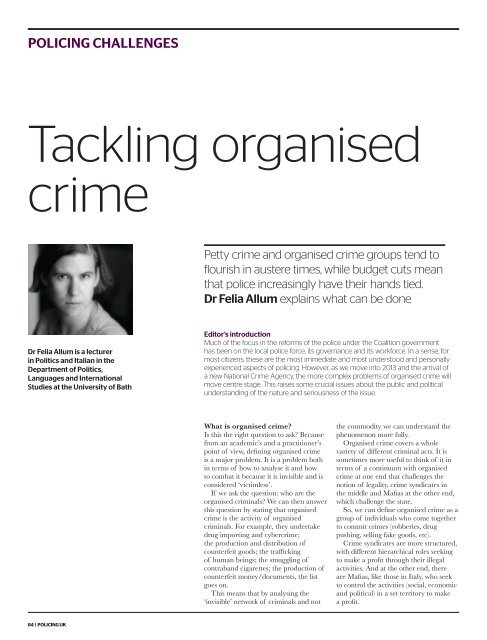Policing UK 2013 - Police Federation
Policing UK 2013 - Police Federation
Policing UK 2013 - Police Federation
You also want an ePaper? Increase the reach of your titles
YUMPU automatically turns print PDFs into web optimized ePapers that Google loves.
POLICING CHALLENGES<br />
Tackling organised<br />
crime<br />
Petty crime and organised crime groups tend to<br />
flourish in austere times, while budget cuts mean<br />
that police increasingly have their hands tied.<br />
Dr Felia Allum explains what can be done<br />
Dr Felia Allum is a lecturer<br />
in Politics and Italian in the<br />
Department of Politics,<br />
Languages and International<br />
Studies at the University of Bath<br />
Editor’s introduction<br />
Much of the focus in the reforms of the police under the Coalition government<br />
has been on the local police force, its governance and its workforce. In a sense, for<br />
most citizens, these are the most immediate and most understood and personally<br />
experienced aspects of policing. However, as we move into <strong>2013</strong> and the arrival of<br />
a new National Crime Agency, the more complex problems of organised crime will<br />
move centre stage. This raises some crucial issues about the public and political<br />
understanding of the nature and seriousness of the issue.<br />
What is organised crime?<br />
Is this the right question to ask? Because<br />
from an academic’s and a practitioner’s<br />
point of view, defining organised crime<br />
is a major problem. It is a problem both<br />
in terms of how to analyse it and how<br />
to combat it because it is invisible and is<br />
considered ‘victimless’.<br />
If we ask the question: who are the<br />
organised criminals? We can then answer<br />
this question by stating that organised<br />
crime is the activity of organised<br />
criminals. For example, they undertake<br />
drug importing and cybercrime;<br />
the production and distribution of<br />
counterfeit goods the trafficking<br />
of human beings; the smuggling of<br />
contraband cigarettes; the production of<br />
counterfeit money/documents, the list<br />
goes on.<br />
This means that by analysing the<br />
‘invisible’ network of criminals and not<br />
the commodity we can understand the<br />
phenomenon more fully.<br />
Organised crime covers a whole<br />
variety of different criminal acts. It is<br />
sometimes more useful to think of it in<br />
terms of a continuum with organised<br />
crime at one end that challenges the<br />
notion of legality, crime syndicates in<br />
the middle and Mafias at the other end,<br />
which challenge the state.<br />
So, we can define organised crime as a<br />
group of individuals who come together<br />
to commit crimes (robberies, drug<br />
pushing, selling fake goods, etc).<br />
Crime syndicates are more structured,<br />
with different hierarchical roles seeking<br />
to make a profit through their illegal<br />
activities. And at the other end, there<br />
are Mafias, like those in Italy, who seek<br />
to control the activities (social, economic<br />
and political) in a set territory to make<br />
a profit.<br />
84 | POLICING <strong>UK</strong>
















